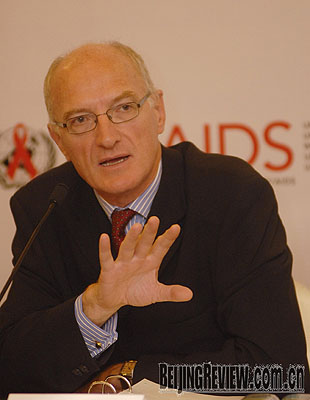|

FIGHTING DISCRIMINATION: Visiting South African High Court Judge Edwin Cameron talks about living with HIV/AIDS at a press conference held by UNAIDS in Beijing on October 30 (WEI YAO)
"I am not speaking from any position of superiority because, coming from a developing country myself, I know about limited governmental resources," said High Court Judge Edwin Cameron of South Africa, when asked about the Chinese Government's programs to combat AIDS at a press conference held by UNAIDS on October 30 in Beijing. "The Chinese Government has a very good treatment program for AIDS."
Cameron, 55, is the only person in public office in South Africa to publicly acknowledge having HIV/AIDS. He is openly gay and has been living with AIDS since 1986. Since 1999 when he disclosed his status, he has devoted himself to fighting the disease. He is the patron of several AIDS-related charity projects and has authored a number of legal and other books. In 2006 Witness to AIDS--part memoir, part compelling analysis-was jointly awarded South Africa's most prestigious literary award for non-fiction, the Sunday Times/Alan Paton Prize.
HIV is typically transmitted through unprotected sex or intravenous drug use and is often associated with marginalized groups, such as gay men, drug users and sex workers. For these reasons, and also because of fears of contagion, people living with HIV are frequently subjected to stigma and discrimination.
Speaking at the XVI International AIDS Conference held in Toronto, in 2006, Peter Pivot, UNAIDS Executive Director, said, "Since the beginning of the epidemic, stigma, discrimination and gender inequality have been identified as the major obstacles to effective responses to HIV. Yet there has never been serious political and programmatic commitment to doing anything about them."
A survey titled Reducing HIV Stigma and Discrimination: A Critical Part of National AIDS Programs indicated that stigma directed at people living with HIV/AIDS not only makes it more difficult for them to come to terms with and manage their illness on a personal level, but also interferes with attempts to fight the AIDS epidemic. On a national level, the stigma associated with HIV/AIDS can deter governments from taking fast, effective action against the epidemic, whilst on a personal level it can make individuals reluctant to access HIV testing, treatment and care.
Amid the world's campaign against AIDS-related stigma and discrimination, China is no exception. The mid- and long-term strategic plan issued by the Chinese Government in 1998 and Actions on HIV/AIDS Prevention and Control promulgated in 2006, banned discrimination against AIDS sufferers and stipulated that HIV-positive people and their families should enjoy equal rights in education, employment, marriage and medical treatment.
However, the Summary Report of China HIV/AIDS Media Partnership (CHAMP) 2008 indicated that discrimination against people with HIV is common. Among more than 6,000 people in six cities interviewed, more than 31.7 percent thought people with HIV/AIDS deserved their disease because of their sexual behavior or drug abuse; interviewees were generally quite unwilling to come into contact with HIV positive people; 47.8 percent said they would be "strongly unwilling" or "unwilling" to eat with an HIV/AIDS infected person; and 30 percent of interviewees thought HIV positive students/children should not be allowed to study at the same school as uninfected children/students.
"What the two epidemics in these two different continents (South Africa and China) have completely in common is this terrific, disabling, overwhelming problem of stigma," said Cameron. "Everywhere I have gone, they have reported to me the high levels of stigma, ostracism and discrimination that people with HIV/AIDS experience in China."
He advised China to extend treatment to all the people living with AIDS. Currently, there are 41,000 people in the country receiving treatment for HIV/AIDS, while according to figures provided by Professor Wang Longde, former Vice Minister of Health, China had about 700,000 people living with the disease in 2007 and expects 50,000 new infections this year. Cameron also said the number of drugs available for AIDS/HIV patients is limited and treatment for opportunity infections is not free, which lead to unnecessary deaths, he added.
Cameron was diagnosed with AIDS 23 years ago and felt severely ill 11 years ago. Anti-virus treatment saved him and has helped him keep fit and vigorous since then. "I should be dead approximately now,'' he said in a speech in 2000. "Instead, I am more healthy, more vigorous, more energetic, and more full of purposeful joy than at any time in my life.''
With his fitness and achievements, Cameron, who has been called "one of South Africa's new heroes" by former President Nelson Mandela, set an example for AIDS/HIV sufferers that they too can lead a fulfilling life. |
